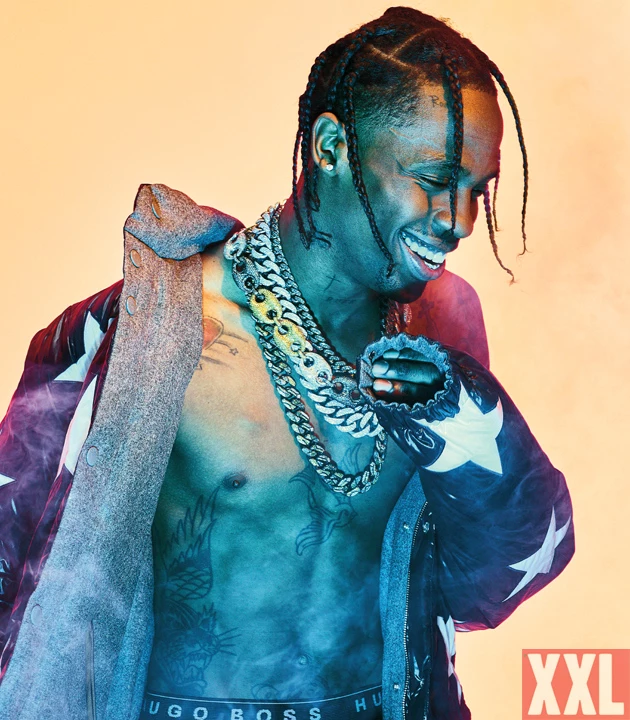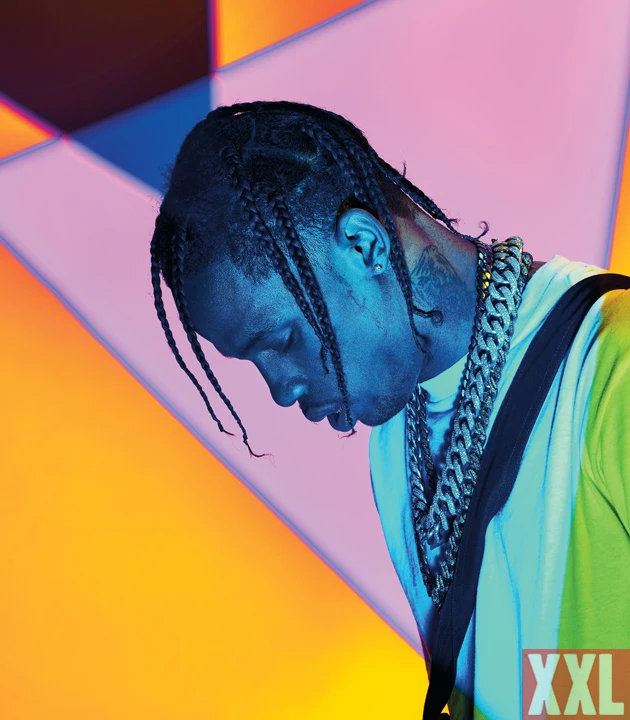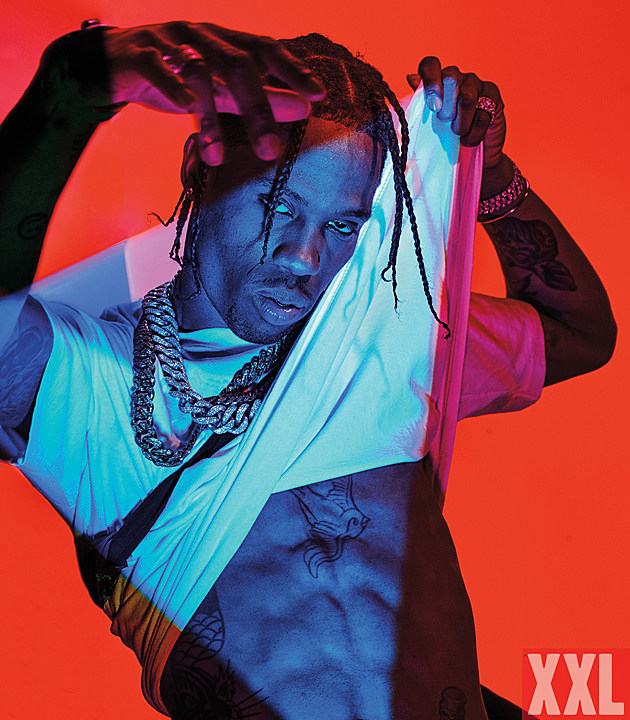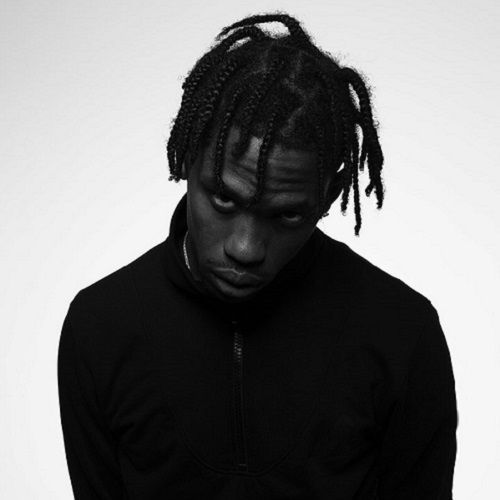Oct. 30, 2005 is a date forever burned into Travis Scott’s memory. It’s the date that Houston’s Six Flags AstroWorld shut down. Eleven years later, on a balmy late November afternoon, Travis stands in a circle with three of his close friends-slash-business associates at Fast Ashley’s photo studio in Brooklyn’s Greenpoint area for his XXL cover shoot, still mourning the loss. They look as though they’re at the funeral repast of a dear friend. “They took AstroWorld away from us in Houston,” Travis says solemnly. “Someone said they took it away to make the rodeo bigger,” one of his boys chimes in. Travis breaks from the prayer huddle to start punching the air. He’s dressed in a dark T-shirt with the heavy metal band Danzig emblazoned across the front and a pair of ripped skinny jeans. With his angry, swinging arms and braids flying, he looks like he belongs in a mosh pit. Travis starts furiously rattling off names of rides. “Texas Cyclone, Mind Bender, Water World, Serial Thriller, Grease Lightnin’.” He’s very passionate about AstroWorld. He even plans on naming his third studio album AstroWorld in its honor. It’s a head-scratcher to think someone would still be that emotionally attached to a theme park, but Travis Scott is only 25 years old. Despite being touted as a genius by many peers and rap’s elder statesmen, his old soul is not immune to boyish desires that once killed boredom for Houston kids and suburban stragglers. When asked what he did for fun after AstroWorld shut down Travis replies, “I started making music.”
Since he was 13, Travis Scott has been crafting songs. A drummer since the age of 3, Travis learned how to make music from his fellow drumming father. The year he turned into a teen, his dad bought studio equipment and Travis started tinkering with it, recording his first song over a Pharrell Williams beat that now escapes him. While attending Lawrence E. Elkins High School, he would drag his home theater system onto the back of his friend’s truck to DJ parties. Travis did a brief spell at the University of Texas, majoring in what he calls a “fake major” of International Business, before dropping out two years later. Life had other plans for him.
2016 was arguably Travis Scott’s year in music. His debut album, Rodeo, arrived the year prior and was certified Gold, hitting the top of the Billboard Rap charts and No. 3 on the Billboard 200. But, the album leaked early, ruining Travis’ planned rollout, which is still a sore spot for the creative rapper. So much so, that for his sophomore effort, Birds in the Trap Sing McKnight, released this past September, Travis went above and beyond to protect his work. He opted to work in controlled environments, like home studios, to prevent any leaking of the album. “Shit, I turned in my album the day it came out,” he says, slumped in a revolving leather chair. “[The label] was telling me not to put it out. You know, because people didn’t hear the songs,” he continues. A quick skim of the project had his label, Epic Records changing their tune. “Man, this is the hardest song ever,” he imitates, sealing the end of a blunt and lighting it up.

Travis was a junior in high school when he tried drugs for the first time. It was a lightweight entrée—the White Widow strain of marijuana—but he got so high that he stumbled into a local gas station and knocked over an entire display of potato chips. “I was high as shit,” he says with a laugh. “I smoked it again, but [now] it’s like…weak.” Over the course of the last four years, Travis’ music has fallen in line with his contemporaries’ knack for crafting a quasi-druggy experience; either through laundry listing their narcotics du jour or simply leaning on production and vocal enhancements that mimic a psychotropic wind tunnel. With Birds in the Trap Sing McKnight, the drug references are at times blatant, while other times woven into this allegory of numbness and struggle. The project topped the Billboard 200 chart, armed with a handful of singles, including the certified Gold “Pick Up the Phone” with Young Thug and featuring Quavo of the Migos. Travis describes the hit track and whole album’s experience as spontaneous. “I was going to Atlanta, to work on a track for the Suicide Squad album and I actually made ‘Pick Up the Phone,’” he says. Despite having its collection of club bangers, the album is packed with some raw emotion. “That’s the part of music where I be like, Man, I want to bring out the feeling.’ Then I was like, Okay, let me make sure the lyrics are fire.” It’s a theme prevalent in the music of his two idols, Kanye West and Kid Cudi, which can seemingly be construed as the most melodic cry for help. For Travis though, his project held the double duty of being a lyrical exercise for himself and a source of venting. “On this album, I felt like I wanted to go in and let people know that I’m really into rapping, but I’m also into making this music purely,” he explains in between puffs of something probably stronger than White Widow. “I made the whole album in this mental state, like I had this straight focus I had to get off my chest. I felt like I worked every day to make sure I could get that shit across on every record. I was like crying out on that shit.”
He polished off the project on Mike Dean’s tour bus (which doubled as a mobile studio) during the final leg of Kanye’s Saint Pablo Tour. As the final lap of 2016 came around, Kanye West canceled his remaining tour dates due to what was reported as a psychiatric emergency, which resulted in a nine-day hospital stay. This past fall, Cudi bravely revealed his own battles with mental illness over social media— primarily depression—and put himself in rehab for a month. It’s been a rough year for Travis’ heroes, but also a cautionary tale of what happens when shit gets too real, or as Travis explains, art gets overlooked. “Honestly, I really can’t speak on others, but in a sense, I feel like every artist always has their problems with the industry because we all want to have our creative way,” he says. “Sometimes, you know, there’s people that block that. Each of those guys [Cudi and Kanye] are geniuses and sometimes people mistake their craziness for crazy and really it s just like, pure genius. Sometimes it s shocking to people. But, you know, those are my brothers. All I’ve learned from them is how to express myself and be me. And you know, they refine. To me personally, they refine. Everybody just has different steps in their life that they take to do what they should. We all here for each other, so we still talk to each other and keep it about spirit. My guys stay 100 percent, whether people think they’re down [or not]. The media be making it seem like they psychos and shit, but they 100 percent, man. They like, 100 percent focused.” In many ways, Travis Scott is rap’s Wizard of Oz. Having hands in some seminal projects—including Jay Z’s Magna Carta Holy Grail, Big Sean’s Hall of Fame, rumored paramour Rihanna’s Anti, and mentor Kanye West’s Yeezus and The Life of Pablo—he keeps mum about his side work for the most part “I don’t talk about them,” he says. “I was on mad platinum albums… I produced and wrote on them.” Still, he didn’t have to be a walking billboard for his presence to be felt, and with his recent release, you can almost backtrack to his sonic DNA on other artists’ projects. “Make your own sound and showcase it,” he says with a smile.

His goals are to work with Beyoncé and Nicki Minaj. “She’s a very good rapper,” he says of Nicki. Travis working with Kanye West came from the same categorical persistence that Kanye harbored in his early days. Both Travis and his right-hand man Dozie would tag team Kanye’s engineer Anthony Kilhoffer over email, blasting him with songs. One day in 2011, Kilhoffer agreed to meet with Travis. There was a caveat: Travis lived in Houston and Anthony in Los Angeles; unaware of where Travis was located. The “Antidote” rapper put together money and flew to Los Angeles for a 15-minute coffee meeting with Kilhoffer. Travis received the “Keep sending me music” brush-off from Kilhoffer—who at the time was knee-deep in Kanye and Jay Z’s Watch the Throne. Travis later released the buzzworthy “Lights (Love Sick)” and it was Kilhoffer who circled back. Their next meeting happened coincidentally right before a Kanye West studio session. The rest is history. For his first look of the shoot, Travis stands in a star-spangled Moncler puffy coat with white Reeboks and skinny jeans. He has no shirt on underneath his coat, showing off a chiseled six pack. A collection of multi-colored chains adorn his neck, dipping well into his chest with his Hugo Boss boxer briefs in full view. It’s a true 1990s rap God look for someone whose music is arguably so futuristic. As the photographer snaps flicks, Travis’ team—made up of his management, stylist, creative director, DJ, Epic Records label reps and friends—swarm to the computer to analyze them. He needs everyone around for feedback. There’s no dearth of irony in watching a crew of people creatively direct a man who has been creatively directing for some of the top names in hip-hop for the last four years. For his second look of the shoot, Travis rocks a blue Balenciaga bomber. When he gazes into the camera his boys start to clown him, saying that look is for “bae.”
So, how does Travis handle being a low key sex symbol? “I don’t know,” he later says bashfully before perking up with, “Fucking with bitches, I guess?” Travis was involuntarily trapped in a rumor mill connecting him to various women, namely his Anti collaborator, Rihanna. He “hates” the topic, tightening up even at the reassurance that he’s not to have a conversation groomed for gossip blogs. He’d much rather talk about his siblings: fraternal twins who are 16. The expression on his face changes once he starts discussing them, and playing his music for them first since they’re his target audience. This is the first year that Travis feels like he has real fans. Having piggybacked on other people’s tours and projects, it’s been hard for him to gauge if they truly loved him or the people who co-signed him. But in 2016 it all came together. “I feel like I pop out more,” he explains. “I’m seeing like, real reactions and it’s crazy. You know, I’ve always been on those tours, The Weeknd and Rihanna. It’s kinda like a mix of fans. So, when I finally did my own tour, it’s finally seeing these kids fuck with me. It’s kind of dope.” As Travis gets a hair and makeup touch up, he tilts his head back revealing the word “Puke” in type-font across his neck. “One day I threw up so bad for like, four days,” he tells. “I was in Toronto. I told myself it was going to be the last time I drank for a long time.” That tattoo memorialized the moment. He has a fly tattooed on the other side of his neck for “Trap,” along with a cross on his face plus an anchor on his cheekbone. “To stay grounded,” he says of the latter. The fame hasn’t been easy. Having a history of rumored outbursts and journalists chasing him for quotes has made Travis a curious case.

He’s neither for or against his breakdowns, but certainly not in denial over them. “I rage out, man, every day, ’cause I’m trying to achieve that goal,” he says. “Breaking down, man, that’s a hard thing to do. It kinda got me to this point now, man, just like, staying focused and breaking through whatever I feel.” He starts banging on the wall, “It’s been times where I’m pulling at my hair and just like…” He starts kicking up his grey Adidas Campus shoe, “Sticking my fucking foot in that muthafucka. And if somebody tell me no? I just make a fucking way, man. That’s just how it’s been like…forever.” Despite only attending his first rock concert this year (Bad Religion with one of his engineers), Travis Scott is a rock star in every sense of the word. His build has been gradual—in music, in love, in drugs—and now he’s poised for meteoric success.
While Birds in the Trap Sing McKnight has barely run its course—with two other singles including “Wonderful” featuring The Weeknd and “Goosebumps” featuring Kendrick Lamar—Travis is already onto the next one. His plan is to make AstroWorld his greatest work yet, bringing to life the one place that lit him up as a child. When asked if he has enough money to open his own AstroWorld, he pensively nods, “Close enough.” But, really in the mind of Travis Scott it’s reopening that lightning in a jar that sparked it all for him. He’s on the hunt for something tangible. “In almost every album I feel like I’m chasing this thing,” he says. “To others it might sound like drugs, to some people it might sound like love, to some people it might sound like success. It’s just this happiness thing I’m trying to find.”
This article was found on xxlmag.com


